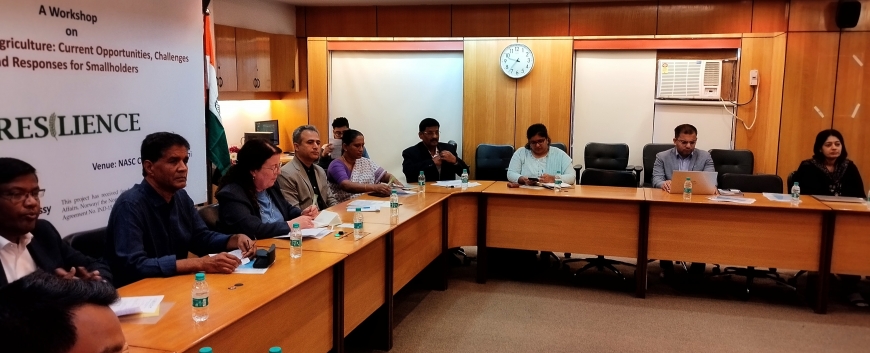Resilience Project hosted a workshop on "Digitalization of Agriculture: Current Opportunities, Challenges, and Responses for Smallholders"
A workshop on "Digitalization of Agriculture: Current Opportunities, Challenges, and Responses for Smallholders" was conducted by the Resilience Project on March 4, 2024, at NASC, New Delhi. In the inaugural session, Ms. Marit Marie Strand, Counsellor at The Royal Norwegian Embassy, New Delhi, highlighted the pivotal role of digitization and commended India's commitment to implementing and sharing digital expertise globally. The counsellor shared her experiences from visits to Odisha and Assam, where the Resilience project operates, highlighting the tangible impact of digitization on the ground.
Dr. Udaya Sekhar Nagothu (Director, International Cooperation, CID - Norwegian Institute of Bioeconomy Research), Dr. Vinod Pandit (Regional Director, CABI - South Asia), Dr. A. K. Nayak (Director, ICAR-National Rice Research Institute, Cuttack) shared their insights in the inaugural session. Dr. Sanjaykumar Chetia (Director of Research, Assam Agriculture University, Jorhat). Dr. Krishnareddy (Director ICT, MANAGE, Hyderabad) chaired the technical sessions.
Resilience project partners NRRI, MSSRF, IWMI presented the use of digital tools in the project areas of Assam and Odisha. The presentations highlighted the role of digital tools in improving Agriculture Productivity, adaptive capacity, and livelihoods of smallholders to climate and economic changes, including key learnings and challenges. Representatives from Digital Green, World Resource Centre (WRI), IIT Delhi, World Food Programme, CIMMYT, and CABI shared their experiences on the use of digital tools in soil, water and pest management, weather forecast, market information as well as agricultural extension and advisory services etc,. 25 participants from National and International organizations attended the workshop.
Participants engaged in group discussions and discussed on the following questions.
- Investments in digital hardware and software: Who bears the costs and payments?
- Capacity building, learning and preparedness of smallholders for digitalization in agriculture.
- Data security and Data protection: Who owns the data collected?
- Inclusiveness and digitalization – gender, youth and marginal groups.
The key outcome of the groups discussions are as follows.
- If models are success in terms of fulfilling the end-users’ requirement, then government starts supporting but innovation should come from different agencies
- Government may provide funding with a business for sustainable and viable model
- Private agencies should invest first for R&D and later on Govt. may support for upscaling
- Recurring cost need to be fulfilled with the help of Common service centers, FPO, SHG and others
- Capacity development of farmers in terms of using the digital apps, infrastructure and cost should be included with the delivery of any software/hardware
- Lack correct data policy. Data localization is important. Cloud competing platforms are abroad and used as resources. If government invests in data, then it needs to be owned
- Simplifying data point is important- collecting too much data is an issue.
- Data agreements need to be in place- who owns the content, updating data
- Tremendous scope for developing entrepreneur programs among rural youth. When power tiller, mechanized tools break down, rural youth needs to be trained for maintenance and custom hiring centers.
- Various Govt agencies such as ATMA, KVKs and SAUs may be used for capacity building of farmers as well as village youths.
This workshop facilitated a comprehensive exploration of the challenges and opportunities associated with digitalization in agriculture, providing a platform for diverse stakeholders to share their perspectives and contribute to the advancement of sustainable agricultural practices. A policy brief will be developed based on the outcomes of the workshop and submitted to the state and central governments.



